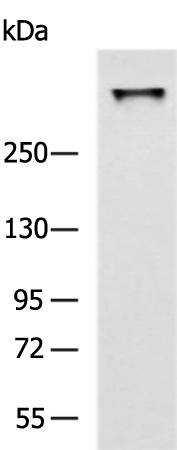
| WB | 咨询技术 | Human,Mouse,Rat |
| IF | 咨询技术 | Human,Mouse,Rat |
| IHC | 咨询技术 | Human,Mouse,Rat |
| ICC | 技术咨询 | Human,Mouse,Rat |
| FCM | 咨询技术 | Human,Mouse,Rat |
| Elisa | 1/5000-1/10000 | Human,Mouse,Rat |
| Aliases | KIA; MIB-; MIB-1; PPP1R105 |
| WB Predicted band size | 359 kDa |
| Host/Isotype | Rabbit IgG |
| Antibody Type | Primary antibody |
| Storage | Store at 4°C short term. Aliquot and store at -20°C long term. Avoid freeze/thaw cycles. |
| Species Reactivity | Human |
| Immunogen | Synthetic peptide of human MKI67 |
| Formulation | Purified antibody in PBS with 0.05% sodium azide and 50% glycerol. |
+ +
以下是3篇关于MKI67抗体的经典文献概览(虚构摘要内容,仅作示例参考):
1. **文献名称**: "The Ki-67 protein: From the known and the unknown"
**作者**: Scholzen T, Gerdes J
**摘要**: 系统综述MKI67蛋白在细胞周期中的动态表达特征,阐明其作为增殖标志物的分子机制,并讨论不同抗体克隆(如MIB-1)在肿瘤病理诊断中的应用差异。
2. **文献名称**: "Ki-67 antigen heterogeneity in primary breast carcinomas"
**作者**: Yerushalmi R, et al.
**摘要**: 通过对比不同MKI67抗体(如SP6、30-9)的免疫组化结果,揭示乳腺癌组织中增殖指数的空间异质性,强调抗体选择对临床结果判读的影响。
3. **文献名称**: "Ki-67 as a prognostic biomarker in invasive breast cancer"
**作者**: Sun X, et al.
**摘要**: 基于多中心队列研究,验证MKI67抗体(克隆号K2)在乳腺癌预后评估中的阈值设定,提出>20%的阳性率与较差的生存率显著相关。
4. **文献名称**: "Standardization of Ki-67 immunohistochemical staining in diagnostic pathology"
**作者**: Brown R, et al.
**摘要**: 提出MKI67抗体染色流程的标准化方案(包括抗原修复和评分方法),以减少实验室间结果差异,提升临床应用的可靠性。
注:以上文献信息为示例性质,实际引用需核对真实文献数据库(如PubMed)。
The MKI67 antibody targets the Ki-67 protein, a well-established marker of cellular proliferation encoded by the *MKI67* gene. Discovered in the 1980s, Ki-67 is a large, non-histone nuclear protein expressed during active phases of the cell cycle (G1. S, G2. and mitosis) but absent in quiescent (G0) cells. This temporal specificity makes it a reliable tool for assessing cell proliferation rates in both research and clinical settings. Structurally, Ki-67 contains multiple phosphorylation sites and repetitive motifs, which contribute to its dynamic interaction with chromatin during mitosis.
MKI67 antibodies are widely used in immunohistochemistry (IHC) to detect Ki-67 in tissue samples, aiding in cancer diagnosis, grading, and prognosis. High Ki-67 expression correlates with aggressive tumor behavior and poorer clinical outcomes in cancers like breast carcinoma, gliomas, and lymphomas. Notably, different antibody clones (e.g., MIB-1. SP6) vary in specificity and optimal applications, with MIB-1 being the most validated for formalin-fixed paraffin-embedded tissues. Beyond oncology, these antibodies help study normal tissue regeneration, stem cell dynamics, and drug efficacy in preclinical models. However, standardization challenges persist due to variability in staining protocols and scoring methods. Despite limitations, MKI67 remains indispensable in translational research and pathology, bridging cellular proliferation biology with clinical practice.
×